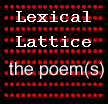
The excess of metaphor (water, windowpane, book) is a game played by the discourse. The game, which is a regulated activity and always subject to return, consists then not in piling up words for mere verbal pleasure (logorrhea) but in multiplying one form of language (in this case, comparison), as though in an attempt to exhaust the nonetheless infinite variety and inventiveness of synomnyms, while repeating and varying the signifier, so as to affirm the plural existence of the text, its return. Thus, in the elevator at Balbec, where Proust's narrator wants to initiate a conversation with the young operator, the latter does not reply, "either because of astonishment at my words, attention to his work, a regard for etiquette, hardness of hearing, respect for the surroundings, fear of danger, slow-wittedness, or orders from the manager." The game here is grammatical in essence (and therefore much more exemplary): it consists in presenting, acrobatically, for as long as possible, the plural diversity of possibilities within a singular syntagm, to "transform" the verbal proposition behind each cause ("because he was hard of hearing") into a double substantive ("hardness of hearing"); in short, to produce a constant model carrier out to infinity, which is to constrain language as one wishes: whence they very pleasure of power.
(Barthes, S/Z, 58-59)

